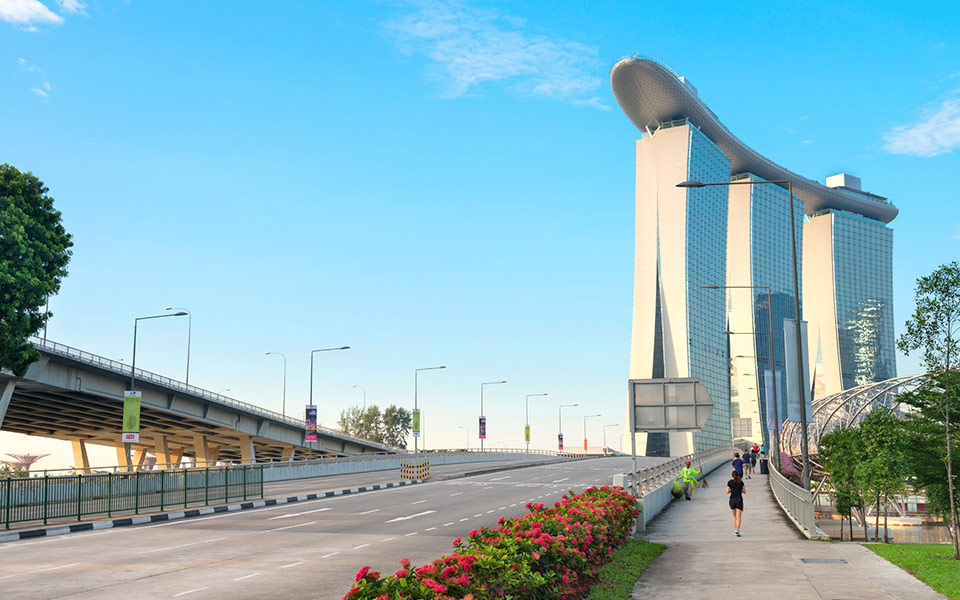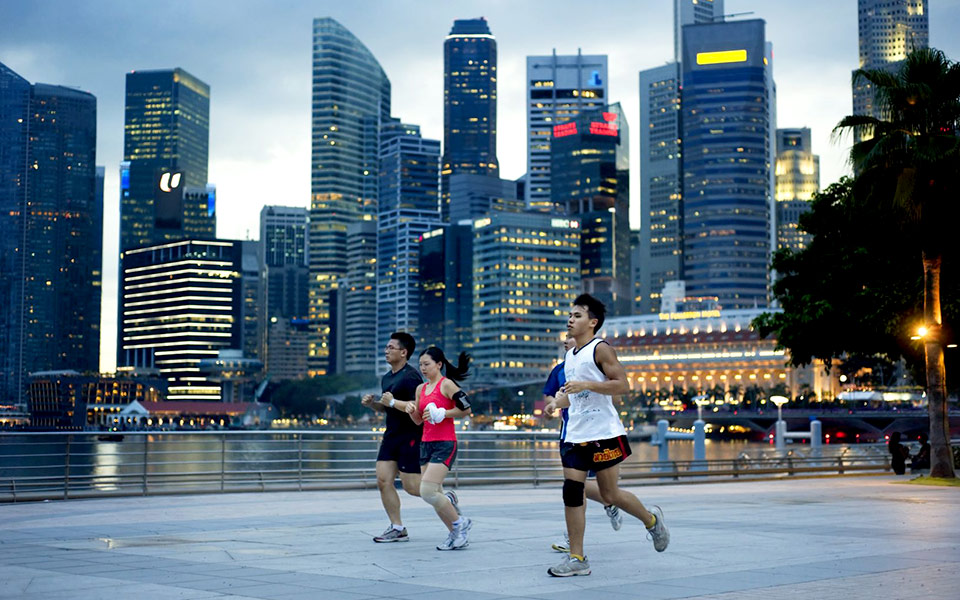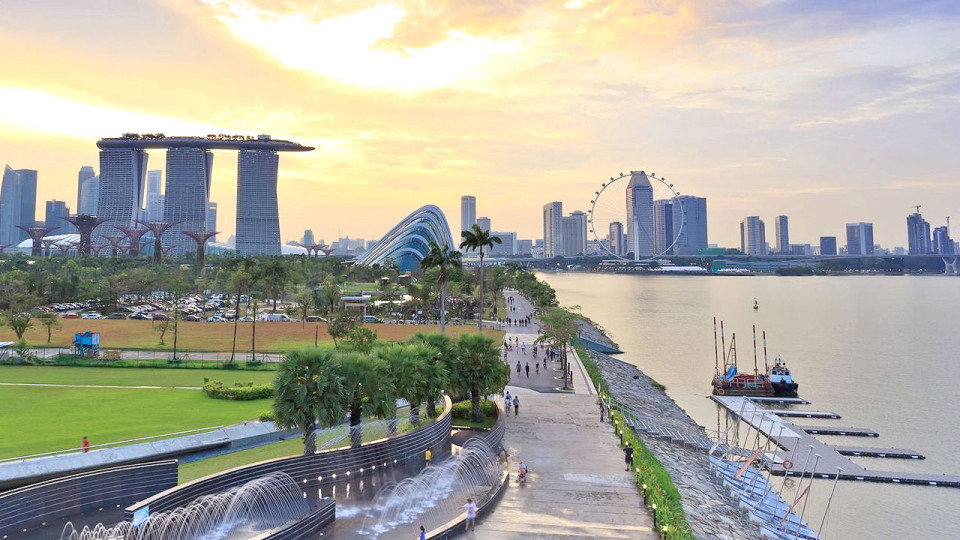How did this subject happen to land in this issue? It all started when a group of us got together and mentioned our preferred running times. Who could imagine that this topic would set up such a lively debate?
Everyone had an opinion. Everyone thought their favourite run time was the best time of day.
Naturally, everyone had a point, but we wanted to go beyond personal preferences. To settle the lively discussion, we delved into research specifically about the best time to run in Singapore, and we’re thrilled to present our findings.
Now, you can discern the most suitable running schedule for yourself in Singapore’s unique climate and environment.
Table of Contents
Just for Morning People
- Run in the morning if you have problems motivating yourself to get out of bed, slide on your shoes and hit your running route. Morning runners don’t have time to think about what lies ahead—they wake up, get their gear and head out the door, so a morning running routine makes perfect sense if motivation is an issue for you. According to research on running habits, morning exercisers excel at consistency, so if you’re a faithful morning runner, you’ve instinctively picked an ideal time to exercise.
- Run in the morning if it’s literally the only time of the day you can find time to fit in an exercise program. Get into the habit of arising earlier than usual so you accommodate both your run and shower time plus tasks you undertake before you leave home. Expect to have a perpetually clear conscience because you always know that no matter how many interruptions you have in your schedule, your run is done for the day!
- Run in the morning because if you’re a competitive runner, this is the time of day most races and marathons kick-off—particularly when heat and humidity pervade Singapore. If you train in the morning, your mind and body will be accustomed to queuing up at the start line in early hours and you will be prepared to run your best race.
- Run in the morning and you’ll experience fewer sleeping issues. For reasons medical science is just beginning to explore, afternoon, evening and night runs tend to interfere with getting a good night’s sleep for some runners, and insomniacs often discover that their afternoon and evening runs are the culprits! Switching to morning ends their sheep-counting rituals once and for all.
Benefits Of Running In The Morning
- Better quality sleep
- Early morning workout is more consistent compared to afternoon, evening or night
- Morning run can build mental strength
- Good for fat burning
- Good to fight depression

Just for Afternoon People
- Run in the afternoon if you follow scientific evidence that has proven that the hours between 4 p.m. and 5 p.m. are optimal because your body temperature is likely at its highest thus your performance will be at its best. Some people experience peak body temperatures as late as 7 p.m., so if 4 p.m. to 5 p.m. doesn’t work for your schedule, no worries. Make it 5 p.m. to 6 p.m. and you’ll still get maximum benefits.
- Run in the afternoon if stressors associated with your job or life are so profound, it’s the only way you can reach equilibrium at day’s end! Think through dilemmas, solve problems, reach solutions and find answers to problems as your cares and tension slips away with each step you take and your mind clears as your muscles help release the stress that builds up throughout the day.
- Run in the afternoon if you undertake “shift work” that requires you to be at your best late in the day and throughout the night. An afternoon run for shift workers is the equivalent of a morning run, because if you sleep late to accommodate your work schedule, you will be more motivated and biologically ready for a pre-work run that kicks off your day.
Benefits Of Running At Noon
- Best for muscle building
- Exercise and engaging during noon will help us to achieve optimal performance
- Opt for long distance runs
- Good for disrupted circadian rhythm
- Lower risk injury
Just for Evening People
- Run in the evening if that’s the only time you can set aside time to undertake your training and conditioning. It takes stamina to elect an evening run—especially if you’ve worked a long day, but you know yourself well enough to understand that once you take those first few strides, you’re ready to undertake your familiar route with enthusiasm or perhaps switch it up and try a new one.
- Run in the evening if it’s the only time you can arrange for someone to watch your children. Mums and Dads need respite from crazy schedules that not only include jobs and housework but social obligations and child-related tasks, so it’s not unusual for parents to set aside time in the evening by relying upon a grandparent or relative to mind the children so they can undertake this important time to unwind.
- Run in the evening because College of William and Mary kinesiologists have proven that early evening (approximately 4 p.m. to 8 p.m.) is when runners experience peak chronobiological oscillation—a fancy way of saying that the body’s torque and hormone load contributes to maximal muscle performance. Therefore, the same amount of effort expended at another time of day is likely to result in better workouts and faster run times if you run in the evening.
Benefits Of Running In The Evening
- Good feeling to beat the end of the day, and release stress
- Good for sprint
- Good for reflexes and alertness
- If you exercise around 4pm -7pm, your exercise performance will boost up on your physical tests, including endurance strength

Just for Night People
- Run at night if you’re uncomfortable in crowds, prefer to have trails or roads to yourself and you are comfortable and feel safe sprinting along your favourite routes. Many people run at night because it’s the only time they can share run time with a fellow club member, friend, spouse or colleague and there’s no need to slow down because nobody has to show up at an event that requires a clean-up once the run is done.
- Run at night because it’s beautiful, soothing and even magical if your favourite route happens to reveal Singapore’s spectacular skyline or landscape, all lit up like a wonderland. Running at night requires locating a route that’s safe and obstacle-free, of course, or what’s the point of flirting with possible injury during the darkest hours?
- Run at night if the heat and humidity for which Singapore is known for gets to you and you have a health concern that can be exacerbated by undertaking your workout during the hottest points of the day from mid-morning to early evening. Even if you usually train during the day, it’s worth your while to switch to a time after the sun sets when weather extremes moderate so you don’t risk heat exhaustion.
Benefits Of Running At Night
- Nighttime run is more effective and automatic as it allows your body to go into a more reactive, automatic state with sharper senses and reflexes.
- De-stress after a long day. Running at night simply makes you feel better. So go sweat out the stress and release some feel-good endorphins with a run in the dark.
- A form of meditation. It allows you to have some quiet headspace to mindfully meditate on your priorities or focus solely on following the rhythm of your breath.
Tips for Everyone
- Run at the same time every day to boost the benefits you get from your workout—no matter when it takes place.
A scientific study “Circadian Specificity in Exercise Training”, conducted in 1989, hasn’t been refuted despite the passage of time: Keep your running schedule to the same time of day and your circadian rhythms may cooperate, thus your best performance time may have more to do with the way you’re wired than the clock.
Who says instinct isn’t an ideal way to decide when a run feels right for both night owls and early birds? - Avoid these times to stay safe and healthy: Since the sun is at its strongest and hottest between noon to 3 p.m., if you pick these hours to run, you can subject your body to all sorts of stressors.
On the other hand, run in the middle of the night—1 a.m. to 4 a.m., for example—and you invite danger from a most unusual source: When the sun’s not out, the process of photosynthesis can’t take place in plants, trees and grasses. As a result, green plants give off much more CO2 than they absorb. Do you want to inhale CO2 when you run? Thought not.
What’s Your Best Time to Run in Singapore?
How about weighing in on this topic? Do you instinctively choose an early or late run because that time of the day “just feels right”, or do life’s demands determine your workout schedule?
There’s a lot to be said about biology and the human spirit, so let us hear from you about your favourite time to run and the motivation that drives you to pick that time slot.
What is the best time to run in Singapore?
The best time to run in Singapore is early in the morning or late in the evening. The temperatures are cooler, and the UV index is lower, making for a more comfortable and safer run.
How does Singapore’s climate affect my running schedule?
Singapore has a hot and humid climate year-round. Running during cooler times of the day, like before sunrise or after sunset, helps avoid dehydration and heat exhaustion.
Is it safe to run at night in Singapore?
Yes, Singapore is known for its safety, even at night. However, runners are advised to stick to well-lit paths, wear reflective gear, and remain aware of their surroundings.
Can I run in Singapore during the midday heat?
It’s not recommended to run in the midday heat in Singapore due to high temperatures and UV levels. Early morning or late evening runs are preferable to avoid heat-related health risks.
Why is hydration important when running in Singapore?
Singapore’s hot and humid climate can lead to rapid dehydration during a run. It’s crucial to stay hydrated before, during, and after your run to maintain optimal body function and performance.
Are there indoor running options in Singapore?
Yes, Singapore offers several indoor running venues such as gyms and indoor stadiums. These are great alternatives to outdoor runs, especially during the peak heat hours or the rainy season.
How does the rainy season affect running in Singapore?
The rainy season in Singapore can cause slippery paths and reduced visibility. Runners are advised to exercise caution, wear appropriate gear, and consider indoor running alternatives during heavy rains.





